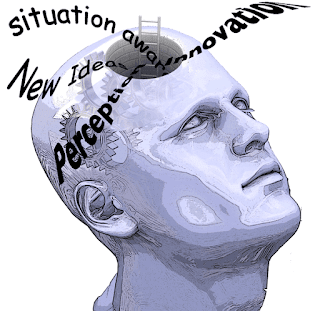How to Train Your Brain to Think in New Ways

You can train your brain to think better. One of the best ways to do
this is to expand the set of mental models you use to think. Let me
explain what I mean by sharing a story about a world-class thinker.
I first discovered what a mental model was and how useful the right
one could be while I was reading a story about Richard Feynman, the
famous physicist. Feynman received his undergraduate degree from MIT and
his Ph.D. from Princeton. During that time, he developed a reputation
for waltzing into the math department and solving problems that the
brilliant Ph.D. students couldn’t solve.
When people asked how he did it, Feynman claimed that his secret
weapon was not his intelligence, but rather a strategy he learned in
high school. According to Feynman, his high school physics teacher asked
him to stay after class one day and gave him a challenge.
“Feynman,” the teacher said, “you talk too much and you make too much
noise. I know why. You’re bored. So I’m going to give you a book. You
go up there in the back, in the corner, and study this book, and when
you know everything that’s in this book, you can talk again.”
So each day, Feynman would hide in the back of the classroom and
study the book—Advanced Calculus by Woods—while the rest of the class
continued with their regular lessons. And it was while studying this old
calculus textbook that Feynman began to develop his own set of mental
models.
“That book showed how to differentiate parameters under the integral
sign,” Feynman wrote. “It turns out that’s not taught very much in the
universities; they don’t emphasize it. But I caught on how to use that
method, and I used that one damn tool again and again. So because I was
self-taught using that book, I had peculiar methods of doing integrals.”
“The result was, when the guys at MIT or Princeton had trouble doing a
certain integral, it was because they couldn’t do it with the standard
methods they had learned in school. If it was a contour integration,
they would have found it; if it was a simple series expansion, they
would have found it. Then I come along and try differentiating under the
integral sign, and often it worked. So I got a great reputation for
doing integrals, only because my box of tools was different from
everybody else’s, and they had tried all their tools on it before giving
the problem to me.”
Every Ph.D. student at Princeton and MIT is brilliant. What separated
Feynman from his peers wasn't necessarily raw intelligence. It was the
way he saw the problem. He had a broader set of mental models.
What Is A Mental Model?

A mental model is an explanation of how something works. It is a
concept, framework, or worldview that you carry around in your mind to
help you interpret the world and understand the relationship between
things. Mental models are deeply held beliefs about how the world works.
For example, supply and demand is a mental model that helps you
understand how the economy works. Game theory is a mental model that
helps you understand how relationships and trust work. Entropy is a mental model that helps you understand how disorder and decay work.
Mental models guide your perception and behavior. They are the
thinking tools that you use to understand life, make decisions, and
solve problems. Learning a new mental model gives you a new way to see
the world—like Richard Feynman learning a new math technique.
Mental models are imperfect, but useful. There is no single mental
model from physics or engineering, for example, that provides a flawless
explanation of the entire universe, but the best mental models from
those disciplines have allowed us to build bridges and roads, develop
new technologies, and even travel to outer space. As historian Yuval
Noah Harari puts it, “Scientists generally agree that no theory is 100
percent correct. Thus, the real test of knowledge is not truth, but
utility.”
The best mental models are the ideas with the most utility. They are
broadly useful in daily life. Understanding these concepts will help you
make wiser choices and take better actions. This is why developing a
broad base of mental models is critical for anyone interested in
thinking clearly, rationally, and effectively.
The Secret to Great Thinking
Expanding your set of mental models is something experts need to work
on just as much as novices. We all have our favorite mental models, the
ones we naturally default to as an explanation for how or why something
happened. As you grow older and develop expertise in a certain area,
you tend to favor the mental models that are most familiar to you.
Here's the problem: when a certain worldview dominates your thinking,
you’ll try to explain every problem you face through that worldview.
This pitfall is particularly easy to slip into when you're smart or
talented in a given area.
The more you master a single mental model, the more likely it becomes
that this mental model will be your downfall because you’ll start
applying it indiscriminately to every problem. What looks like expertise
is often a limitation. As the common proverb says, “If all you have is a
hammer, everything looks like a nail.”
When a certain worldview dominates your thinking, you’ll try to explain every problem you face through that worldview.
Consider this example from biologist Robert Sapolsky. He asks, “Why
did the chicken cross the road?” Then, he provides answers from
different experts.
- If you ask an evolutionary biologist, they might say, “The chicken
crossed the road because they saw a potential mate on the other side.”
- If you ask a kinesiologist, they might say, “The chicken crossed the
road because the muscles in the leg contracted and pulled the leg bone
forward during each step.”
- If you ask a neuroscientist, they might say, “The chicken crossed
the road because the neurons in the chicken’s brain fired and triggered
the movement.”
Technically speaking, none of these experts are wrong. But nobody is
seeing the entire picture either. Each individual mental model is just
one view of reality. The challenges and situations we face in life
cannot be entirely explained by one field or industry.
All perspectives hold some truth. None of them contain the complete truth.
Relying on a narrow set of thinking tools is like wearing a mental
straight jacket. Your cognitive range of motion is limited. When your
set of mental models is limited, so is your potential for finding a
solution. In order to unleash your full potential, you have to collect a
range of mental models. You have to build out your toolbox. Thus, the
secret to great thinking is to learn and employ a variety of mental
models.
Expanding Your Set of Mental Models
The process of accumulating mental models is somewhat like improving
your vision. Each eye can see something on its own. But if you cover one
of them, you lose part of the scene. It’s impossible to see the full
picture when you’re only looking through one eye.
Similarly, mental models provide an internal picture of how the world
works. We should continuously upgrade and improve the quality of this
picture. This means reading widely from good books, studying the fundamentals of seemingly unrelated fields, and learning from people with wildly different life experiences.
The mind's eye needs a variety of mental models to piece together a
complete picture of how the world works. The more sources you have to
draw upon, the clearer your thinking becomes. As the philosopher Alain
de Botton notes, “The chief enemy of good decisions is a lack of
sufficient perspectives on a problem.”
The Pursuit of Liquid Knowledge
In school, we tend to separate knowledge into different
silos—biology, economics, history, physics, philosophy. In the real
world, information is rarely divided into neatly defined categories. In
the words of Charlie Munger, “All the wisdom of the world is not to be
found in one little academic department.”
World-class thinkers are often silo-free thinkers. They avoid looking
at life through the lens of one subject. Instead, they develop “liquid
knowledge” that flows easily from one topic to the next.
This is why it is important to not only learn new mental models, but
to consider how they connect with one another. Creativity and innovation
often arise at the intersection of ideas. By spotting the links between
various mental models, you can identify solutions that most people
overlook.
Tools for Thinking Better
Here's the good news:
You don't need to master every detail of every subject to become a
world-class thinker. Of all the mental models humankind has generated
throughout history, there are just a few dozen that you need to learn to
have a firm grasp of how the world works.
Many of the most important mental models are the big ideas from
disciplines like biology, chemistry, physics, economics, mathematics,
psychology, philosophy. Each field has a few mental models that form the
backbone of the topic. For example, some of the pillar mental models
from economics include ideas like Incentives, Scarcity, and Economies of
Scale.
If you can master the fundamentals of each discipline, then you can
develop a remarkably accurate and useful picture of life. To quote
Charlie Munger again, “80 or 90 important models will carry about 90
percent of the freight in making you a worldly-wise person. And, of
those, only a mere handful really carry very heavy freight.”
I've made it a personal mission to uncover the big models that carry
the heavy freight in life. After researching more than 1,000 different
mental models, I gradually narrowed it down to a few dozen that matter
most. I've written about some of them previously, like entropy and inversion, and I'll be covering more of them in the future. If you're interested, you can browse my slowly expanding list of mental models.
My hope is to create a list of the most important mental models from a
wide range of disciplines and explain them in a way that is not only
easy to understand, but also meaningful and practical to the daily life
of the average person. With any luck, we can all learn how to think just
a little bit better.
By Olonade Olawale
(Brain Feels)




















